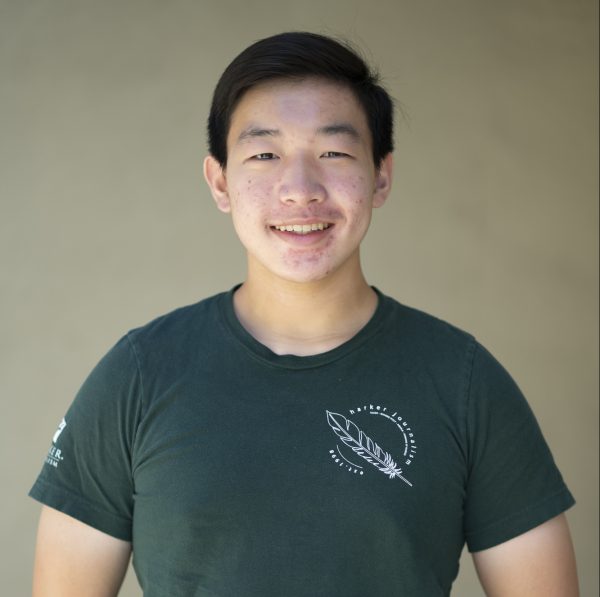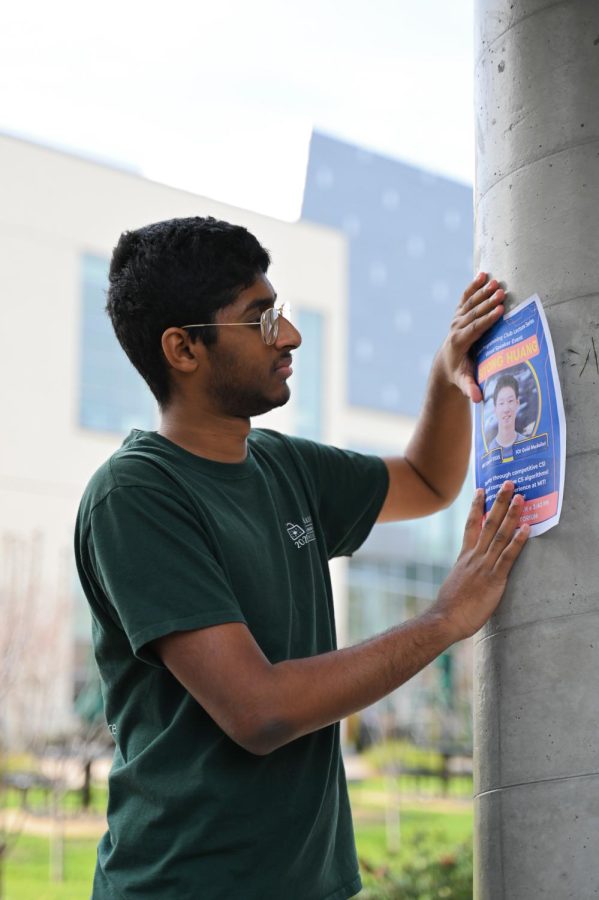Humans of Harker: Programming positivity
Rishi Cherukuri explores and shares his passion for all aspects of computer science
“I stuck with computer science because it has so many real world applications that other disciplines don’t. You can make so many different inferences about a real world situation like basketball given just a bit of data,” Rishi Cherukuri (12) said.
For Rishi Cherukuri (12), computer science extends far beyond the tedious grind of coding competitions and idle entertainment. Instead, the subject represents a gateway to meaningful insights, an opportunity for exploration and most importantly, a powerful tool to impact the world for the better.
Rishi’s journey with computer science began over six years ago, when he stumbled across one of his older brother’s textbooks on a rather uneventful day. Throughout his middle school years, his interest in the subject only deepened.
“My motivation for computer science has always been ‘I want to be better than my brother,’” Rishi said. “I feel competitive about everything. Even outside of coding, like in math and table tennis for example, I always try to improve faster than everyone else even though I started a bit later.”
Although the majority of Rishi’s hobbies tend to fade in and out of his life, computer science never lost its initial charm. As he entered high school, Rishi branched out into the world of game design and large scale coding projects, drawn towards the applicability and unlimited possibilities of such endeavors.
Rishi saw artificial intelligence projects as a way to combine his passions for both computer science and basketball, creating a model that compared NBA players to each other based on their career statistics. Inspired by the film “Moneyball” and hoping to win arguments over which basketball players were better than others, Rishi eventually coded a program capable of analyzing over 40 different statistics for each player and drawing conclusions about their skill level.
“I stuck with computer science because it has so many real world applications that other disciplines don’t,” Rishi said. “You can make so many different inferences about a real world situation like basketball given just a bit of data.”
Thanks to Harker’s plethora of machine learning classes, Rishi made fast progress in turning his basketball project from an idea into reality. However, there were moments where small bugs in his code stumped him for weeks on end. For Rishi, getting over those challenges is what made the experience so rewarding in the end.
“The project really taught me how to approach problems in general,” Rishi said. “It taught me how to think in an analytical way and dig deeper, and it made me a better critical thinker as a whole.”
When Rishi started exploring game design in eighth grade, he was surprised by how little code it took to create an entertaining and functional game. According to Rishi, game design was initially way out of his comfort zone, as he had to work with the game engine Unity and code in C#, a language that he had no experience with at the time.
“When I made my first platformer game, it was a complete disaster,” Rishi said. “But I was really happy that I made something tangible that I could play and have fun with for maybe just five minutes.”
Rishi especially enjoys the freedom game design gives to the user in comparison to conventional competitive coding. While designing his platformer, he had the ability to think outside the box and code in whatever features he wanted, a refreshing alternative to the confining nature of traditional coding problems.
“Coding competitions all use well established algorithms that everyone needs to know for whatever competition they’re doing,” Rishi said. “Game design is more free. As long as something makes sense in the scope of your game and you have an idea, you can code it up in the game.”
Aside from bettering himself through computer science, Rishi also finds joy in bringing that knowledge to others through tutoring and lecturing. Throughout high school, Rishi spent many weeks as a teacher for young computer science students at the STEM-based company AlphaStar, and he also regularly hosts lectures for Programming Club.
“Rishi is such an enthusiastic programmer, and he has been able to bring lectures to Programming Club in a way that more people attend than ever in the years that I’ve seen,” Programming Club advisor Susan King said. “There’s something about him and his leadership style that just draws people in.”
In fact, Rishi spreads his enthusiasm not only in Programming Club but everywhere he goes. Close friend Stephen Xia (12) described Rishi as both a supportive and jovial person to spend time with.
“Rishi is really reliable and enjoyable to be around,” Stephen said. “Part of what makes him funny is his very strange lack of street skills in very specific areas. He can tell you the best path to get to Mitsuwa the fastest while simultaneously not knowing how to use a map.”
Close friend Gordon Chen (12) echoes Stephen’s remarks about Rishi’s joyous and humorous nature. Whether it’s breaking his wrist while doing math problems or forgetting how to hold a fork, Rishi turns every experience into a funny and memorable one.
“Rishi is probably the most unique individual you will ever find,” Gordon said. “No one else is both as smart and stupid as him, and I mean that in the most lovable way possible. When he messes up, you don’t get mad, you just laugh a lot. You hug him and everything is great.”

Edward Huang (12) is a co-managing editor for the Winged Post, and this is his fourth year on staff. This year, Edward wants to continue creating unique...
Tiffany Chang (12) is the editor-in-chief of Humans of Harker, and this is her fourth year on staff. She’s looking forward to telling the story of the...


















![“[Building nerf blasters] became this outlet of creativity for me that hasn't been matched by anything else. The process [of] making a build complete to your desire is such a painstakingly difficult process, but I've had to learn from [the skills needed from] soldering to proper painting. There's so many different options for everything, if you think about it, it exists. The best part is [that] if it doesn't exist, you can build it yourself," Ishaan Parate said.](https://harkeraquila.com/wp-content/uploads/2022/08/DSC_8149-900x604.jpg)




![“When I came into high school, I was ready to be a follower. But DECA was a game changer for me. It helped me overcome my fear of public speaking, and it's played such a major role in who I've become today. To be able to successfully lead a chapter of 150 students, an officer team and be one of the upperclassmen I once really admired is something I'm [really] proud of,” Anvitha Tummala ('21) said.](https://harkeraquila.com/wp-content/uploads/2021/07/Screen-Shot-2021-07-25-at-9.50.05-AM-900x594.png)







![“I think getting up in the morning and having a sense of purpose [is exciting]. I think without a certain amount of drive, life is kind of obsolete and mundane, and I think having that every single day is what makes each day unique and kind of makes life exciting,” Neymika Jain (12) said.](https://harkeraquila.com/wp-content/uploads/2017/06/Screen-Shot-2017-06-03-at-4.54.16-PM.png)








![“My slogan is ‘slow feet, don’t eat, and I’m hungry.’ You need to run fast to get where you are–you aren't going to get those championships if you aren't fast,” Angel Cervantes (12) said. “I want to do well in school on my tests and in track and win championships for my team. I live by that, [and] I can do that anywhere: in the classroom or on the field.”](https://harkeraquila.com/wp-content/uploads/2018/06/DSC5146-900x601.jpg)
![“[Volleyball has] taught me how to fall correctly, and another thing it taught is that you don’t have to be the best at something to be good at it. If you just hit the ball in a smart way, then it still scores points and you’re good at it. You could be a background player and still make a much bigger impact on the team than you would think,” Anya Gert (’20) said.](https://harkeraquila.com/wp-content/uploads/2020/06/AnnaGert_JinTuan_HoHPhotoEdited-600x900.jpeg)

![“I'm not nearly there yet, but [my confidence has] definitely been getting better since I was pretty shy and timid coming into Harker my freshman year. I know that there's a lot of people that are really confident in what they do, and I really admire them. Everyone's so driven and that has really pushed me to kind of try to find my own place in high school and be more confident,” Alyssa Huang (’20) said.](https://harkeraquila.com/wp-content/uploads/2020/06/AlyssaHuang_EmilyChen_HoHPhoto-900x749.jpeg)



